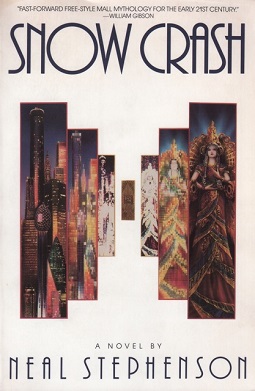Snow Crash

Cover of the U.S. paperback version
|
|
| Author | Neal Stephenson |
|---|---|
| Cover artist | Bruce Jensen |
| Country | United States |
| Language | English |
| Genre | Science fiction, Cyberpunk, Postcyberpunk |
| Publisher | Bantam Books (USA) |
|
Publication date
|
June 1992 |
| Media type | Print (hardback & paperback) |
| Pages | 480 |
| ISBN | (first edition, hardback) |
| OCLC | 25026617 |
| 813/.54 20 | |
| LC Class | PS3569.T3868 S65 1992 |
| Followed by | The Diamond Age |
Snow Crash is Neal Stephenson's third novel, published in 1992. Like many of Stephenson's other novels it covers history, linguistics, anthropology, archaeology, religion, computer science, politics, cryptography, memetics and philosophy.
Stephenson explained the title of the novel in his 1999 essay In the Beginning... was the Command Line as his term for a particular software failure mode on the early Apple Macintosh computer. Stephenson wrote about the Macintosh that "When the computer crashed and wrote gibberish into the bitmap, the result was something that looked vaguely like static on a broken television set—a 'snow crash' ". Stephenson also mentioned a book by Julian Jaynes, The Origin of Consciousness in the Breakdown of the Bicameral Mind, as one of the main influences for Snow Crash.
The book presents the Sumerian language as the firmware programming language for the brainstem, which is supposedly functioning as the BIOS for the human brain. According to characters in the book, the goddess Asherah is the personification of a linguistic virus, similar to a computer virus. The god Enki created a counter-program which he called a nam-shub that caused all of humanity to speak different languages as a protection against Asherah (a re-interpretation of the ancient Near Eastern story of the Tower of Babel).
...
Wikipedia
